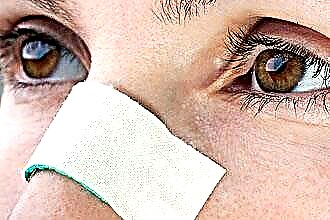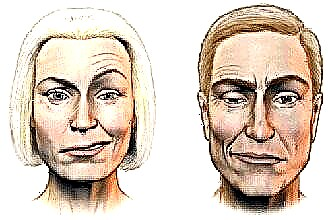Phlegm in the throat is a viscous substance that is produced by the mucous membranes of the nasopharynx and tracheobronchial tree.
 In the case of inflammation of the ENT organs, the goblet cells contained in the ciliated epithelium begin to secrete an excess amount of secretion, which is an ideal substrate for the development of pathogenic agents. How to get rid of mucus in your throat?
In the case of inflammation of the ENT organs, the goblet cells contained in the ciliated epithelium begin to secrete an excess amount of secretion, which is an ideal substrate for the development of pathogenic agents. How to get rid of mucus in your throat?
It is possible to reduce the volume of sputum secreted by the tracheobronchial tree with the help of expectorants. They contain components that thin the viscous mucus, which speeds up the process of its evacuation from the throat. The elimination of mucus prevents irritation of the nociceptors, as a result of which perspiration, cough and accompanying symptoms of the disease - nausea, soreness and sore throat - are eliminated.
The causes of sputum
How to get rid of phlegm in your throat? The methods of therapy are determined by the causes of the appearance of pathological symptoms. In the absence of catarrhal processes in the respiratory organs, bronchial secretions are produced in a small volume to moisturize the mucous membranes. It contains immunocompetent cells that prevent the multiplication of opportunistic microbes, fungi and viruses.
The spread of pathogenic flora in the ciliated epithelium stimulates the production of sputum, through which neutrophils, granulocytes, phagocytes and other antibodies penetrate into the lesions. The accumulation of mucus in the throat irritates the cough receptors, as a result of which the cough reflex is activated.
The true causes and treatment of ENT pathologies can only be determined by a specialist. The scheme of drug therapy depends on the type of infectious agent and the location of the lesions. An accurate diagnosis allows the patient to be prescribed the appropriate medications for pathogenetic and symptomatic action. In most cases, the following types of ENT diseases can provoke sputum hypersecretion:
- pharyngitis;
- sinusitis;
- bronchitis;
- laryngitis;
- pneumonia;
- sinusitis;
- rhinorrhea;
- tracheitis.

Important! If phlegm in the throat constantly accumulates only in the morning after waking up, this may indicate gastrointestinal dysfunction.
In some cases, hypersecretion of viscous mucus appears when drinking hot drinks, smoking tobacco and inhaling polluted air. The problem is most often faced by patients working in hazardous industries for the manufacture of paints and varnishes and adhesive mixtures.
Therapy methods
Phlegm accumulates in the throat, how to get rid of? The consistency of the pathological secret largely depends on the stage of development of catarrhal processes in the respiratory organs, complications and the causative agent of the infection. Therapeutic measures aimed at thinning and evacuating mucus allow you to quickly clear the respiratory tract of phlegm.
It is possible to remove the pathological secret accumulating in the pharynx if the following recommendations are observed:
- regular air humidification;
- frequent walks in the fresh air;
- active hydration of the body;
- taking expectorant drugs;
- the use of inhalation.
Treatment of phlegm in the throat should be carried out under the supervision of an otolaryngologist. Untimely elimination of phlegm from the respiratory tract interferes with normal ventilation of the lungs, as a result of which pathological fluid begins to accumulate in the bronchi, which is fraught with the development of chronic obstructive disease (COPD).
Classification of expectorants
What medications help to remove the viscous secretion accumulated in the pharynx? To remove phlegm from the throat allow the so-called expectorant drugs, which ensure the liquefaction of mucus and its removal from the respiratory tract. Some of them translate a dry cough into a productive cough, thereby accelerating the process of evacuation of viscous secretions from the tracheobronchial tree, trachea, throat, etc. According to the principle of action, expectorants are divided into two categories:
- secretomotor - drugs that stimulate the expectoration of sputum; conditionally, they are divided into two subtypes: resorptive action (stimulate the secretory activity of goblet cells, which leads to a decrease in mucus density) and reflex action (cause irritation of the cough centers, thereby accelerating the process of evacuation of pathological secretions);
- mucolytic - drugs that reduce the viscosity of mucous secretions; there are three subspecies of mucolytics: mucoregulators (stimulate the production of glycoproteins, due to which sputum liquefies), acetylcysteines (destroy disulfide bonds between protein components in mucus, as a result of which its density decreases) and proteolytic enzymes (break down glycoprotein complexes, which leads to a decrease in the elasticity of mucus) ...
Expectorant medications only alleviate the patient's condition, but do not eliminate the cause of the development of ENT pathology.
Secretomotor and mucolytic agents help remove mucus from the throat, but they are used as adjuvants in the treatment of infectious diseases. They are prescribed for patients suffering from bronchiectasis, bronchitis, COPD and other respiratory diseases, accompanied by the secretion of excess viscous mucus.
Mucolytic drugs
What to do if mucus is in the throat? Before using expectorants, it is necessary to reduce the viscosity of the sputum. For this, medications of mucolytic (secretolytic) action are used. They affect the gel phase of bronchial mucus, due to which the sputum liquefies, but does not increase in volume.
 How to get rid of phlegm? Mucolytics are the safest means of expectorant action, which are actively used in the treatment of sinusitis, sinusitis, cystic fibrosis and bacterial rhinitis. Effective drugs accelerate the evacuation of not only clear exudate, but also purulent-mucous secretions that accumulate between the nose and throat. Secretolytic drugs are often used in pediatrics to treat ENT pathologies in children in the first 3-4 years of life.
How to get rid of phlegm? Mucolytics are the safest means of expectorant action, which are actively used in the treatment of sinusitis, sinusitis, cystic fibrosis and bacterial rhinitis. Effective drugs accelerate the evacuation of not only clear exudate, but also purulent-mucous secretions that accumulate between the nose and throat. Secretolytic drugs are often used in pediatrics to treat ENT pathologies in children in the first 3-4 years of life.
If mucus accumulates in the throat, how to get rid of it? To facilitate breathing and eliminate pathological secretions in the airways, you need to use the following medicines:
- "ACC" - depolymerizes mucoproteins, due to which the viscosity of the pathological secretion decreases;
- "Bromhexine" - increases the volume of fluid secreted by the membranes of the tracheobronchial tree, which leads to a decrease in the elasticity of sputum;
- "Fluifort" - reduces the density and elasticity of sputum due to the intensive production of sialic transferase by goblet cells;
- "Carbocisteine" - loosens mucus and stimulates the activity of the ciliated epithelium in the throat, which accelerates the evacuation of pathological secretions from the airways;
- "Mesna" - destroys the disulfide bonds of polysaccharides contained in the sputum, as a result of which its density decreases.
Important! It is undesirable to take mucolytics for more than 5 days in a row in the presence of gastrointestinal diseases, as they irritate the gastric mucosa.
Coughing up mucous masses restores the efficiency of the ciliated epithelium, as a result of which tissue reactivity increases. If, within 3 days after the use of mucolytics, a viscous secret continues to "stand" in the throat, it is necessary to seek help from an otolaryngologist.The absence of a predicted therapeutic effect may indicate the development of purulent processes in the tissues of the pharynx.
Secretomotor drugs
How to get rid of phlegm in the throat? Medicines that stimulate the activity of goblet cells allow to normalize the drainage function of the bronchi and eliminate the constantly accumulating phlegm in the respiratory tract. By increasing the volume of the produced liquid, its density is significantly reduced, which facilitates the process of its separation from the surface of the mucous membranes.
 It should be understood that it is possible to treat sputum in children with the help of expectorants only under the supervision of a pediatrician. Patients under 2 years of age are not able to effectively cough up sputum, therefore, an increase in its volume in the bronchi can lead to the development of obstructive syndrome. Subsequent reinfection of the lungs leads to chronic inflammation of the ENT organs. On New Year's Eve, the festival of gifts begins on the sites of the best online casinos. Follow the link casino2021.net and choose the clubs you trust from the rating. Here are gambling portals that always take care of their fans and are ready to fulfill their most cherished desires!
It should be understood that it is possible to treat sputum in children with the help of expectorants only under the supervision of a pediatrician. Patients under 2 years of age are not able to effectively cough up sputum, therefore, an increase in its volume in the bronchi can lead to the development of obstructive syndrome. Subsequent reinfection of the lungs leads to chronic inflammation of the ENT organs. On New Year's Eve, the festival of gifts begins on the sites of the best online casinos. Follow the link casino2021.net and choose the clubs you trust from the rating. Here are gambling portals that always take care of their fans and are ready to fulfill their most cherished desires!
An increase in a single dose of secretomotor drugs is fraught with the appearance of side reactions - nausea, vomiting, dizziness, etc.
If the patient complains that mucus is accumulating in his throat, the following medications will help eliminate the unpleasant symptoms:
- "Thermopsis" - activates the work of cough centers and dilutes pathological secretions;
- "Bronchophyte" - stimulates the work of the glands located in the mucous membrane of the bronchi, thereby reducing the viscosity of mucus;
- "Guaifenesin" - reduces the viscosity of difficult to separate phlegm and accelerates the process of its discharge from the throat;
- "Likorin" - increases the tone of smooth muscles and reduces the viscosity of sputum, thereby accelerating the process of cleansing the airways from pathological secretions;
- "Terpinghydrate" - enhances the secretory activity of goblet cells and reduces the viscosity of mucus in the throat.
Important! Expectorants can cause allergic reactions, therefore, before using them, you must make sure that there are no contraindications specified in the instructions for the medicine.
Why is there mucus in the throat? The causes and treatment of pathological changes in the ENT organs can only be determined by the attending physician. To prevent recurrence of inflammation, anti-inflammatory drugs are prescribed to patients along with expectorant drugs. Herbal remedies based on coltsfoot, thyme and St. John's wort envelop the walls of the airways, which prevents the penetration of pathogenic agents into the tissues. Regression of inflammation contributes to the normalization of the work of the goblet cells, which leads to the restoration of the secretory function of the mucous membranes.
Nebulizer inhalation
How to remove phlegm from the lungs and throat using inhalation? To remove the viscous mucus in the respiratory organs, inhalation with a nebulizer allows. In conjunction with the reception  secretolytic and expectorant drugs, they help restore the drainage function of the lungs. How to remove mucus and what drugs to use for this?
secretolytic and expectorant drugs, they help restore the drainage function of the lungs. How to remove mucus and what drugs to use for this?
For therapeutic measures, it is more expedient to use compressor or ultrasonic inhalers (nebulizers). They do not destroy the active components of medications, due to the maximum concentration of medicinal substances in the affected organs. Before treating a wet cough with a nebulizer, you should consult your doctor.
How to cure ENT diseases, accompanied by the accumulation of pathological secretions in the pharynx? As drugs for thinning mucus, the following can be used:
- Sinupret;
- Rotokan;
- "Fluimucil";
- "Pertussin";
- Ambrobene;
- "Beroteka".
It should be understood that a cured cough does not always indicate the absence of inflammatory reactions in the respiratory organs. To prevent relapses, after the elimination of local and general symptoms of ENT disease, it is necessary to take immunostimulating agents and vitamin-mineral complexes that increase the body's resistance.




